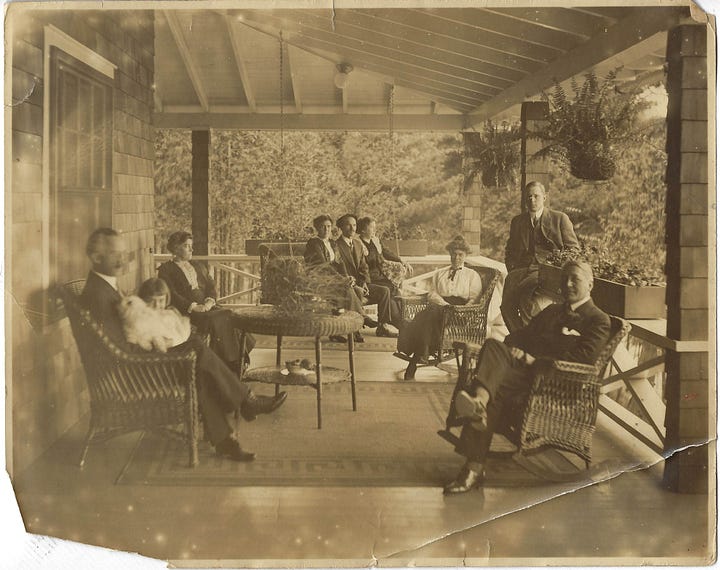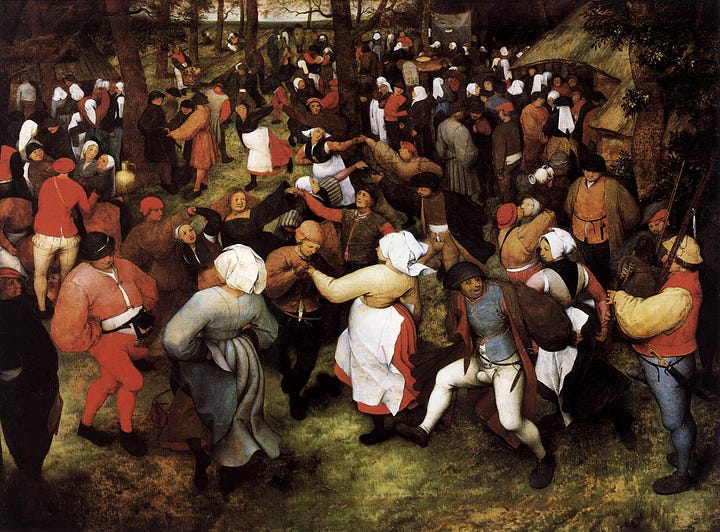How to Save Substack From Certain Peril
The "One Weird Trick" to Real Growth and Success on Substack
I am often not very certain of what it is that I actually write about on here. Of the more than twelve-thousand people who’ve elected to receive email updates from Hickman’s Hinterlands, perhaps 40% of them open these emails, or about 4,800 souls. Of these, a few hundred have even elected to pay me for the various essays, rambles, and screeds that I ever publish here. And of these, basically any I’ve ever asked for any kind of feedback simply say something like: “I think you should write whatever you like, and publish it whenever you like!”
This kind of feedback, while extraordinarily generous, does not give me much of an opportunity to make a “business plan,” nor does it provide many insights into why anyone unsubscribes, or cancels a paid subscription.
Nonetheless, I cannot help but wonder what I am doing right and what I am doing wrong. I comb through the various metrics; I write up lengthy notes and assessments and strategies — I attempt to discern some kind of a pattern in what may or may not bring value to you, the reader. In all of my efforts in this direction, I have discerned exactly no patterns whatsoever. In truth, making a living on Substack appears to be a completely random thing — and when newer Substackers inquire as to how I ever managed to gain the sort of following I have on here, or how I’ve somehow managed to make a living doing this, I can give them no answers at all. This is because I myself do not understand the inner workings of this site, nor do I understand what has ever delighted readers so completely that they decide to become paid subscribers to this publication.
Nevertheless, everything I use, wear, or eat, and indeed the very house in which I reside — it is all paid for by a couple hundred generous souls who, in reading my written work, have decided that I ought to do nothing but write. I have honored their request with a certain degree of amazement — it is a profound privilege to get to do this for a living. In fact, as we await the birth of our firstborn child, our paid subscribers are quite literally feeding and clothing a baby — truly, God bless you; we love you all.
But each of these wonderful patrons of mine has no doubt lent me an offering for a number of different reasons. Some simply like my style, or the ‘shape’ of my ideas; others enjoy travelogues, or long, anachronistic essays about Upstate New York, or Catholicism. Others were drawn to the Falling Back in Love With America project — or to my fondness for rural America, or my strident criticism of modernity and the grim ‘human monoculture’ it has spawned. I cannot keep track of the multiplicity of reasons that some of you may subscribe to this publication: I can only continue writing and hoping that you will be edified by what I do here. And I can only pray that as my wife and I welcome our child into the world, this strange living I’ve begun making here won’t just altogether dry up one day.
The fear that maybe it will indeed “dry up” is exactly what has ever had me curiously scrolling through articles about “How to Succeed on Substack.”


And of course, it has lately been the fashion here to write about how to become successful on Substack. Invariably, when I scroll through the Notes section of this website, I see several articles hawking “This One Weird Trick” for Substack success, and so on. Many employ what some have called “The Hook Method.” This is a strategy that many herald as being extraordinarily efficacious with regards to stimulating growth, and they urge me to try it. But I have my suspicions about it.
It works like this: If I were to write an article about some of my travels, I might like to title it something like “A Long Walk Across Delaware.” Such a title would serve just fine if, after long-distance walking across The First State, I wanted to share the experience here. But to practitioners of “The Hook Method,” this title would be completely insufficient. For, after all, the title is the first interaction with the reader — and the reader is a potential customer.
Instead, a proper hook would require that I take an inventory of what I learned on the trip, and to locate some strange and unexpected insight that would defy conventional ideas about traveling, or about Delaware, or some kind of a weird “gotchya” that I could work into the title. I might call the article “Delaware: It’s Not as Boring as You Think,” or “The Most Underrated State: Why You Need to Get to Delaware ASAP.”
This is, in essence, what gaining attention online is all about: building an implicit syntactical schema, finely tailored to whatever may pass for conventional wisdom among conventional people — and implying that you are about to share information that will shatter that wisdom and cast it all in a new light. Many entertaining, interesting, fascinating things are built in essentially this fashion. Jokes, for example, most often involve exactly this sort of thing — and the punchline is funny precisely because it is unexpected, not only in its content, but in its very syntax.
“Why did the chicken cross the road?” is a question that, in the drab and un-funny world of conventional speech, might have a legitimate answer. “To get to the open bag of feed on the farmer’s porch” would be a reasonable answer that is, at least to chicken-keeping sorts of people, more mundane than it is humorous. The classical punchline answer: “To get to the other side!” is funny, or is at least funny in theory, because it has turned the syntax of the question on its head. The answerer has playfully and daftly assumed that the inquirer to whom he is replying might have been seriously asking whether a chicken crossing the road is indeed trying to get to the other side. Conventionally, an inquiry like this would be built around discerning the reason the chicken would do such a thing, and takes it as a foregone conclusion that anyone — chicken or not — crossing the road is obviously attempting to get to the other side.
And so the “to get to the other side” answer is a cheeky bit of humor, as it simultaneously makes you wonder about the answerer (“is he daft?”) and Judo-throws you into an aimless bit of reflection on the very purpose of language.
This somewhat elementary example works here only to describe how the “gotchya” drives human interest. It removes its listener from the mundane, with a little daftness and a jocular spirit. And in quite the same way, the “hook method” that many Substack growth gurus are selling is built in the same way. Or, as former Yankees outfielder Oscar Gamble once said: “They don’t think it be like this — but it do.”
And so it would be that if I had endeavored to walk across the State of Delaware in a single go, I might not want to use the title “A Long Walk Across Delaware” because it does not set the reader up for a “gotchya” moment. There is no surprise etched into a title like this; it is a title that plainly informs the reader, before he has even begun to read, that the essay is about a long walk across Delaware. Our Substack growth gurus look at this and say: “Boring!” and declare that a piece titled in this manner will not stimulate the growth we are all, no doubt, desperately seeking on Substack.
A growth-minded author, then, might title it differently. If, in walking across Delaware, I was shocked by how wonderful this seldom-written-about and seldom-visited state is, I might title it: “The State You Don’t Know Anything About,” or “Is Delaware Really Just Credit Card Companies and Joe Biden?”
Or, if the unexpected insights the trip gave me had more to do with walking, or with traveling itself, I might title the piece: “My Traveling Secret: The Unexpected Truth of Long-Distance Walking.”
Obviously, I am not very good at this. These titles are a little ridiculous, and in making the point about the “hook method,” they’re completely on-the-nose, and not the sorts of titles that I would ever use. But nevertheless, perhaps you see what I mean — these are attention-grabbing titles that have a subtext etched onto them rather plainly. That subtext basically boils down to: “You, the reader, aren’t as smart as you think — here’s the secret information you need to know, and only I have it.” And at the end of such an article, there are numerous admonishments to pay the author if you’d like to wade deeper into his private world of coveted knowledge. Sometimes, at this point, there is even a subtext implying that you’d be foolish not to part with some of your gold doubloons for the great privilege of gaining more of this hidden knowledge.
Without going off the reservation too far here, I am led to ask: Doesn’t this mode of communicating our ideas contain the seed of the Gnostic heresy? The author is positioned as one who is in possession of esoteric information; of information not known to the general public. He is the secret insider with The Truth — and in publishing it, he is inviting the reader into his secret circle of people who are ‘in the know.’ He is also now and again subtly denigrating (or “negging”) his reader — by implicitly suggesting that the reader needs a teacher, needs a source for some sort of truth that is beyond his grasp; truth that in the regular course of his life he would not be able to locate on his own. And so he requires a guru of some kind.


The initiation of this process, strangely enough, seems to contain the same rhetorical and syntactical structure as humor. Our “hook” titles are, in a sense, simply more advanced versions of “why did the chicken cross the road?” No one thinks the author will say “to get to the other side,” and if the reader is amazed by this delightfully esoteric and unexpected kind of information, why, he ought to remember to Like and Subscribe!
Americans in particular seem to be completely addicted to this kind of thing. Our nutrition experts are all warring chieftains of obscure, mystical, gnostic cults — to delve into health and wellness discourse online is to descend into a miniature version of the Reformation or the Second Great Awakening. Political commentators offer all sorts of paranoiac conspiracies, some demonstrably true and others laughably false — and in the arena in which they operate, there are many voices aiming to “wake up the Sheeple.” Financial planners of all stripes debate the merits of various investment strategies, and each lingers in the digital public square, with their collar up and their trenchcoat open, muttering, “hey kid… there’s this one weird trick to increasing your retirement portfolio’s gains… click here!”
What we have created, in essence, is a digital environment that is quite akin to the old medicine shows or chaotic markets bustling with snake oil salesmen. A veritable casino of secret information — virtually none of it verifiable, and much of it downright wrongheaded or even irresponsible to share. On the streets of this market, normal, well-adjusted, curious folk veer in to have a look, hoping to find something genuinely beautiful or rare — but eventually, one of the merchants hawking their chinsy wares manages to cast a spell on them, and then they’re “hooked.” What follows is a reading public who seems to have been cut adrift from the original, lofty, noble intentions a reader might initially have — plunged into a hypnotic world of secret information, insider clubs, premium subscriptions, nutritional master courses, and obscure religious, political, and cultural information that they hold onto as if it were coveted treasure.


This is, for the record, exactly the gamut of hazards that ever brought about the death of other social media platforms. Those of us old enough to remember the first generations of Facebook can compare those quaint old days to present-day Facebook — which is rife with “AI slop,” boomer memes, outrageous dramas, and pyramid schemes that make you wonder aloud at who would fall for such ridiculous dreck. Lately, the app formerly known as Twitter appears to have been making the same sort of descent. In the last few weeks, many users have been asking about algorithm reform — as the X timeline appears to be an endless, cacophonous bedlam of drama, political madness, aimless extremism, ghastly pornographic spectacles, and boorish commentary of the worst sort.
Of course, both Facebook and X did not shy away from the chaotic, snake-oil-salesman elements within their user base. To the contrary, they embraced them — and they embraced them in the name of good business. The Gnostic-esque, “gotchya,” esoteric model of communication and sales goes, after all, straight to the brain-stem. It triggers the same responses as sugar and sex and gambling — it is the fastest way to coax users into clicking, scrolling, and ultimately, buying. The brain-stem is the dynamo at the center of a new cultural and informational ecosystem — to deviate from the basic structure of its cravings and urges is to doom one’s enterprise; it is to secure a starkly uncompetitive position in the Brave New World of the creative economy.
In writing this, I think of the great country star Tracy Byrd, who sang the following lines in his hit song entitled Drinkin’ Bone:
The drinkin' bone's connected to the party bone
The party bone's connected to the staying out all night long
And she won't think it's funny and I'll wind up all alone
And the lonely bone's connected to the drinkin' bone
These lyrics come to mind simply because the literature bone ain’t connected to the brain-stem bone. The greatest, most edifying written works are not “hook-shaped.” They are not built like sticky honeypots to dupe apparently-pedestrian dim-wits into shelling out another few bucks — no truly great written work is designed to ensnare the reader with a neverending and Daedalian chain of “gotchyas.”
In fact, the only ‘bone’ that is connected to the ‘brain-stem bone’ is, at day’s end — the lonely bone. This is because the sort of written work produced by Edward-Bernays-tier marketing tactics will be intrinsically unable to fulfill the real, deep, radically human requirements of real literature. No neon lights ever led a soul to the heavenly face of God — no admonishments to “click here” ever lifted a human spirit out of the ravagements of his own darkness or bruised condition. There is no rest in such a world of snake oil and neon; there is only the whirling, feverish, devilish madness of more and more and more — and in the end, all that is produced by such written work is an unfillable “hole” or void; a chasm that gapes so large it looms like a glacial morass where no poetry of any kind can survive. It is here that the soul sinks; this is the phenomenon that puts the “doom” in “doom-scrolling.”
Perhaps in the end, real art worthy of the name cannot survive on the internet at all. Perhaps the digital environment ultimately stretches the creative work of men far too thin for it to ever weave its magic in the hearts of the seekers and the romantics; like some lunatic streets of Bangkok or Calcutta or New Orleans, here, the light is too bright for men to see — the sounds are too overwhelming for the delicate whispers of the angels and the muses and indeed, of God Himself to be tasted or heard. Instead — hooch and hollering, trance-like litanies of cults and derangements so large and so intense they crush human thought itself in the end. A world of mere matter to be packaged and sold — a portrait of life that consists only of dopamine and reels and lonely all-night orgies of blue-light scrolling and brief, two-dimensional moments that make users utter a flat “wow” and move on.
If indeed Substack is to maintain its present position in a lasting way — if indeed it is to be a kind of refuge for those who have ever sought to find real beauty on the internet; perhaps these reflections must be taken quite seriously or we shall all lose in the end. Yet as we see infinite scroll and reels and a seemingly limitless frontier of growth salesmen and gurus run rampant across this online haven of ours — one wonders if the rot has already taken root. One wonders if it is always inevitable; if indeed, the lovers of the “beautiful internet” will always be forced to wander from site to site and platform to platform. It really may be that every great era on every website is only an ephemeral thing — that there is something intrinsic or fundamental about the technological backbone of large websites that forces the hand of their owners and managers; a need for capital and funding and money that leaves them with no choice but to tickle the brain-stem forever, again and again and again until there is nothing left.
After all, heavy-duty webhosting ain’t cheap. The bills have got to get paid somehow, and as platforms grow in size, the costs increase, and the temptation to reach for the “hooks” in the brain-stem may become too intense to resist.
If this is the case — what keeps us from logging off forever? What keeps us from parlaying the great moments we have here, the successes, the communities, the sublime and heavenly art and friendships and enriching things we have ever found online — and taking them into the “IRL” world? What keeps us from taking all of this off the screen and out into the Hinterlands?




I suspect that our ceaseless quest for a website or platform that does not degenerate into a blinking-neon brain-stem tickling scheme is only a symptom of a wider problem. If our world offline weren’t one-tenth as bleak as it now is — would we even be trying to build something beautiful online at all? In truth, I believe we would not. I believe the internet would then only be a side-dish to a far richer main course. But these days, things have gotten bad enough that for many of us — though crucially, not all — there is nothing but the internet. Certainly, this is true in my case, and I know quite factually that it is the case for many, many more than just me. We use the internet as a surrogate for all that we have tried and failed to obtain offline — and it is a weak surrogate indeed; where it seems to sate our hunger for the good things of this life, it comes only as a brief ephemerality that will soon expire, nothing more.
In the end, there is no “one weird trick” to “save Substack.” I have no estoeric knowledge on this matter to teach or share or give. I have no “pitch” that would tell you to “like and subscribe,” and I take it as a foregone conclusion that you, dear reader, are a human being who is whole and living and real — containing depths that are, from where I now sit, unknowable to me. But I wish to know you more deeply; I wish to love you if I could — to love as the artist loves, or to know something of how God loves, or to share in the kind of affection and warmth that compatriots and community-members and friends know. If I cannot give you this here and now — I hope to at least give you some real encouragement along the way; to gesture toward some heavenly signpost to the good and the true and the beautiful. And if, at the end of it, you wish to press a penny into the hands of a digital wayfaring bard like myself, I give you not only my thanks but a seat at my table; be it here at my home or anywhere I might visit on earth.
Here, you pay not to be teased with “gotchyas” nor to scroll and scroll nor to receive secret information. You offer a gift to a friend; you pay to know that another soul sees some of what you see, and wishes to see still more and to share it with you as he is able. You pay so that my baby might eat while I pine for heaven publicly; seeking to bring the holy genius of great God almighty out into the sunlight for all to see and adore — that life might be more and more laden with good gifts and blessings and beauties, rendered worthwhile, raised to the status of the only gift that we will ever taste together.
On that score, please bear with me as I try. Our time may be short; but for that, we shall not go hungry if I have anything to say about it at all.
Let us pray that the good things we have come to know and enjoy on this website will not stop flourishing and proliferating for years to come. If they should, however, you must know that I will not be going away — we will find one another again, in cyberspace or on the living soil, and there, we will recognize one another as true friends.
Post-Script:
I wish to tell all of you who read Hickman’s Hinterlands that I am lately under a great deal of pressure. Between my mother’s slow death from cancer in Hospice, my wife’s pregnancy and imminent birth, and my own nerve-fraying worries about supporting a family as a writer, or about my and my wife’s apparent inability to stay put for any length of time — I am finding it quite difficult to write. Furthermore, we are lately limited in our ability to wander about the Hinterlands in search of worthwhile stories for this publication, and are trying to save up our money besides; and so please forgive me if I have not been posting as much, or if the quality of my work has faltered whatsoever.
Thankfully, we have just arrived back at our home in the Adirondacks, where my wife can be comfortable in the weeks leading up to her giving birth; and because of this, we are not with my mother right now, and I will have far, far more time to focus on writing for Hickman’s Hinterlands. And so in the weeks to come, we shall be returning to the regular programming here, and it is my aim to post a little more often than usual.
Truly, I cannot say it enough: Thank you to all the paying readers here, you do a great mercy not only to me personally, but to our family. This innovative and unexpected way of deriving an income on which to support a family is a Godsend to us; for as you know, we have never fit very squarely into the Way Things Are in the world today. You’ve very generously given us your patronage, and for it, we live a decent life. Let us hope that I am able to return your goodwill in tenfold, however I can.
Sincerely,
A.M. Hickman



Perhaps what people are glad to pay for in this case, rather than some snake-oil secret knowledge, is an honest and distinctive voice that cuts against the prevailing cultural grain--in part by being resolutely old-fashioned, in some sense. Whatever you write about, you'll be writing from that angle and feeding folks something they're evidently hungry for. I wouldn't worry overly about metrics and such, seems to me that's never been your way (or your "brand," if we must talk in such terms). Just keep making cast-iron-skillet-over-campfire cuisine in the age of digital pop tarts and people will keep coming, I expect. Thanks for avoiding the gimmick trap.
This essay is exactly what I'm here for. Interesting oblique angle rambling on the page heartfelt thinking. You uncover some truths that "normal" thinkers can't see. One might say you are the "one weird trick" to getting back to thinking, and therefore a bit of truth.
And on the schedule... please don't feel the need to pop out essays on schedule. It's the off schedule essay drop that tells me you're really working on stuff up there. The day you feel you MUST post to meet a deadline is the day you need to get out of the house and travel.